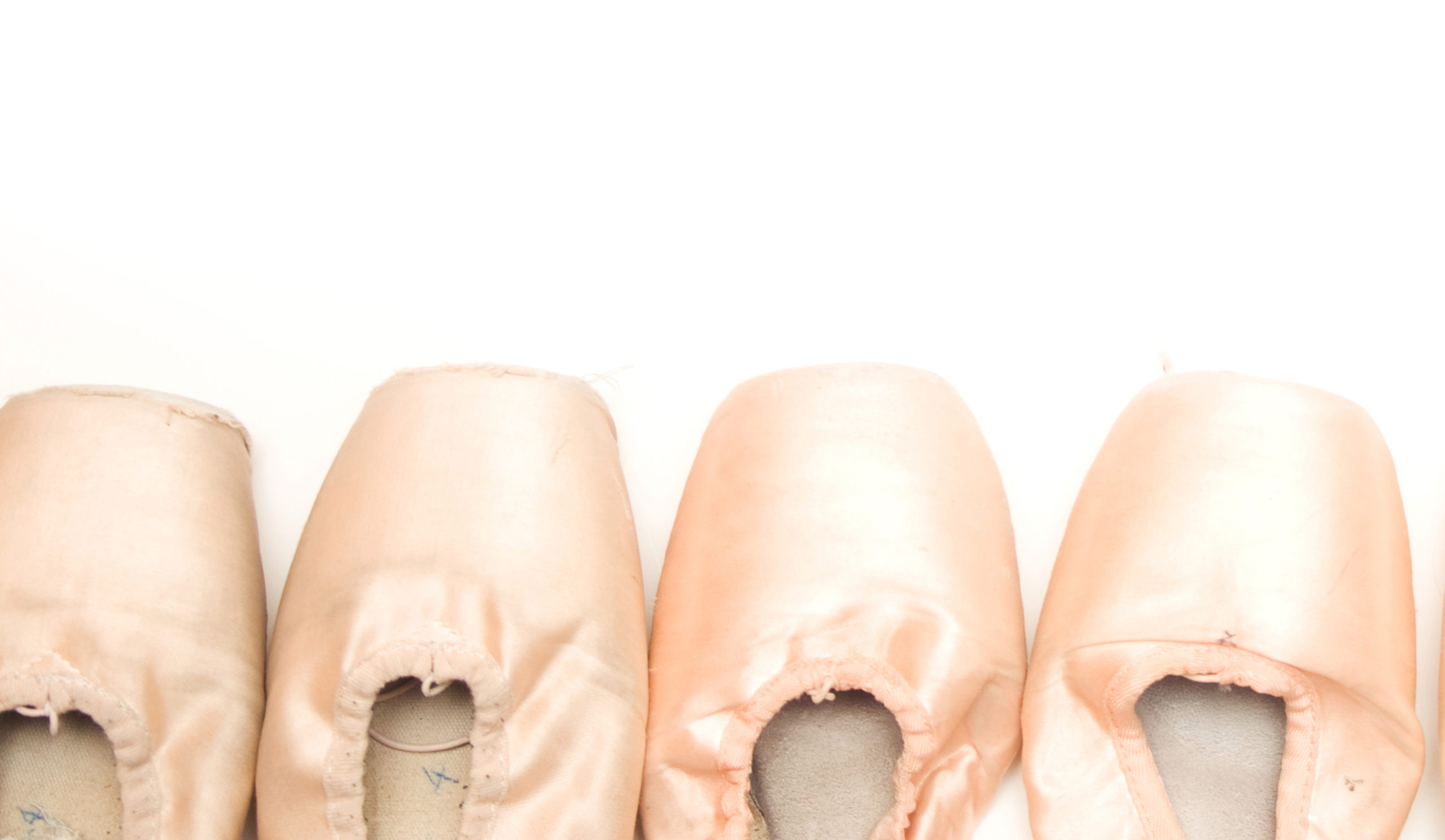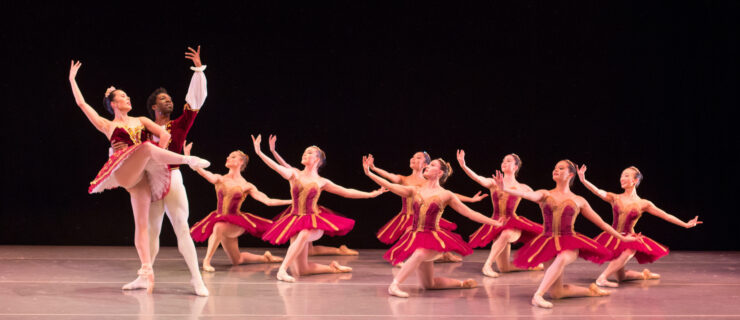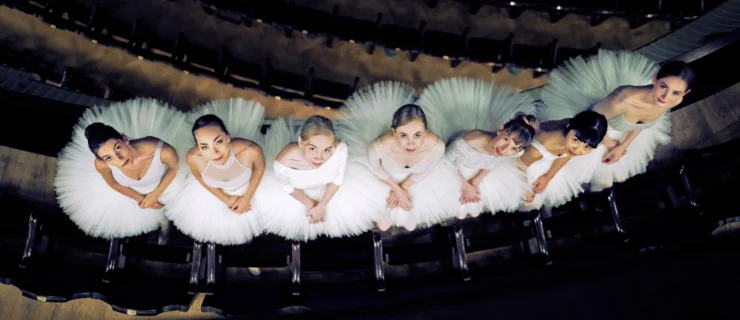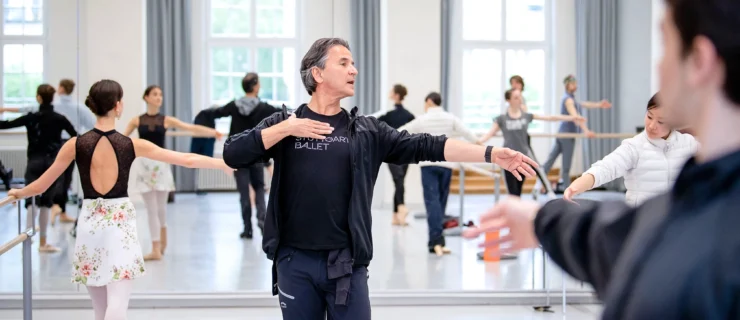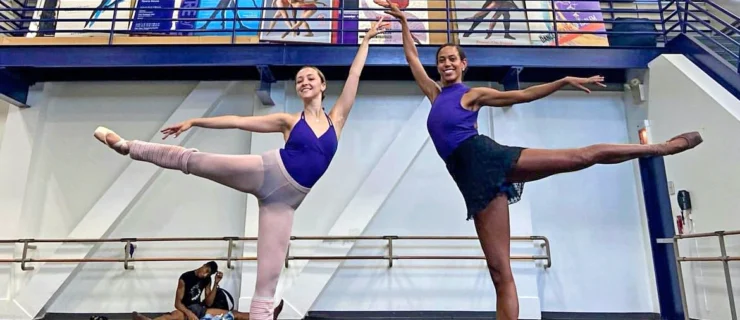Summer Stories
Summer intensive study has become an integral part of training for most preprofessional dancers. Usually, it’s the chance to focus on and improve technique and even make new friends. Though unfamiliar styles of instruction and technique may be frustrating and intimidating at first, and younger students may get homesick, many use the summer to explore dance in new places with different teachers.
To make the experience as positive as possible, dancers should take time during the winter months to audition for several programs, and consider all aspects of each programbefore making a choice. When the match is just right between dancer and program, going away for summer study can be a marvelous blend of challenge and enjoyment.
That’s just what Dani Bahrynian found when she took the summer off from Southern California’s Westside School of Ballet last summer to try Pacific Northwest Ballet’s intensive program in Seattle.
She expected to be challenged and to learn a lot, but she was surprised that the summer was pleasurable too. “The teachers made every class fun. Everyone there was really into making it the best summer they possibly could,” she says. “There is a notion that if you go away it will be really scary and the teachers will be intimidating, but everyone at PNB cares about you as an individual.”
Brandon Sears had a similar experience at Milwaukee Ballet last summer. He had left his native Indiana for study at Boston Conservatory and Boston Ballet, but returned to Indiana to determine his next move. Milwaukee’s program seemed attractive for its location, professional opportunities and the people. “It’s a very nurturing environment, and the teachers and company members were encouraging and helpful. You can grow and make mistakes [there] without feeling too bad about it,” he says. At the end of the six-week intensive, Sears was selected to work with MBII, Milwaukee’s training company.
Summer programs can be demanding. “It was the hardest I’ve ever danced,” says Chanteal Moss, who trains in the preprofessional program of Atlanta Ballet and studied with Alonzo King’s LINES Ballet in San Francisco over the summer. “They push you, and you push yourself. At LINES they teach you to let go of your fears and insecurities, to believe you’re a great dancer.”
Summer study in Europe proved eye-opening for Lydia Wellington, a student at the School of American Ballet who attended the Bartholin International Ballet Seminar in Copenhagen last summer, studying with teachers from the Bolshoi, Royal Danish Ballet and Paris Opera Ballet. “In Europe, a lot of summer programs are not by audition,” she says. “They are more relaxed—dancers aren’t all planning their summers in January. There were dancers on different levels, and the teachers accommodated them. They corrected you according to your level.”
A primary benefit of summer training is the improvement most dancers see. While it may be overwhelming at first, getting corrections from different teachers allows many students to make technical leaps. “I overcame so many bad habits,” Bahrynian says. She also saw improvements in both her extension and turns on pointe.
Sears appreciated that his teachers were “all on the same page. They had different teaching styles, but worked toward common goals. They talked with each other and built on each other’s work,” he says.
It may be difficult to feel adventuresome during the regular school year, but an intensive is a great time to expand your horizons. “The main attraction for me was all the different styles and techniques,” says Wellington about Bartholin; like other SAB students, she was encouraged to broaden her training with summer study elsewhere.
LINES’s approach was a major departure for Moss, who confesses some trepidation at first but embraced the chance to learn by stepping out of her comfort zone. She was also uncertain about how her home teachers would respond after the summer, but says they were pleased when she returned. “One teacher said, ‘I’ve never seen you dance so wonderfully, with such freedom.’ They also noticed more musicality,” she says.
Moss picked LINES for its contemporary style and focus on artistry, musicality and expression. “You can get overwhelmed by seeking perfect technique,” she says. “[Summer at] LINES was a huge growing process, about trusting in your own technique, being unafraid in your body and letting go. But when I wasn’t thinking about my technique, it got better.”
For a lucky few, summer study can increase a student’s professional options, especially for students who are able to relocate year-round. Making contacts and getting exposure can lead to career opportunities. Like Sears, Moss was invited to stay at her current school (Atlanta Ballet) after attending a summer program there. She recalls that her first intensive helped her understand dance as a career. “It was a taste of professional life,” she explains. “You had to pick things up fast [for frequent performances], which helped you know if you’d want to be in a company. There were so many great master teachers; it opened a lot of doors.”
Just being exposed to other styles can help a dancer’s career by giving a better idea of how different styles fit your interests and abilities. “[Branching out] diversifies how I think about ballet,” says Wellington. “I can choose what I really like.”
Being on your own is a great way to gain maturity. Wellington was glad to study in a European city rather than staying in New York, where she has been an SAB student for 10 years. She liked having a greater degree of independence and sharing an apartment with another teen dancer. “I liked being on my own,
setting my own schedule,” she says. Her mother stayed nearby, and they talked daily, but she felt comfortable exploring Copenhagen alone.
The level of independence was just right for Bahrynian at PNB, who relished getting out and about in Seattle. “It was secure—the dorm had practical rules, and I talked with my parents every night. I didn’t feel babysat but always felt safe,” she explains.
The best age to begin summer study varies from student to student. Wellington felt that age 15 was the right age for her to first study away from home, although some of her friends ventured away from home as young as 14.
Summer study can be an enriching experience, a chance to find out what other schools have to offer. But it can also be simply enjoyable to deeply explore your greatest passion with like-minded people. “It was so fun, so thrilling,” says Bahrynian. “I had the summer of my life.”
Jennifer Brewer is a dancer, teacher and freelance writer based in Saco, ME.
